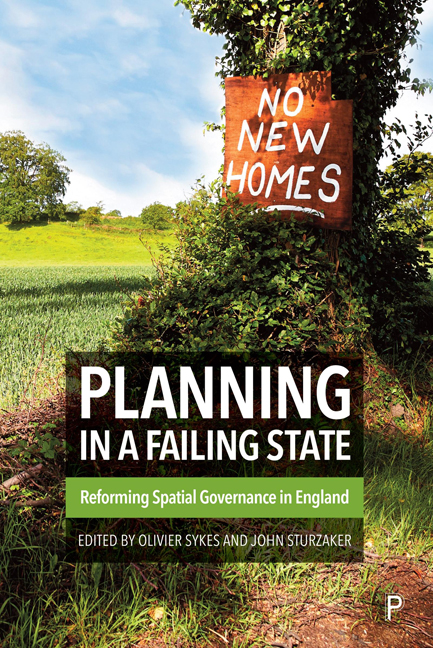Book contents
- Frontmatter
- Dedication
- Contents
- List of figures and tables
- Notes on contributors
- Acknowledgements
- 1 Introduction
- 2 The (housing) numbers game
- 3 Localism: the peccadillos of a panacea
- 4 Planning at the ‘larger than local’ scale: where next?
- 5 PD games: death comes to planning
- 6 Building beauty? Place and housing quality in the planning agenda
- 7 Zoning in or zoning out? Lessons from Europe
- 8 Planning and the environment in England, 2010–22: cutting ‘green crap’, Brexit and environmental crises
- 9 Stuck on infrastructure? Planning for the transformative effects of transport infrastructure
- 10 Conclusion
- Index
6 - Building beauty? Place and housing quality in the planning agenda
Published online by Cambridge University Press: 27 March 2024
- Frontmatter
- Dedication
- Contents
- List of figures and tables
- Notes on contributors
- Acknowledgements
- 1 Introduction
- 2 The (housing) numbers game
- 3 Localism: the peccadillos of a panacea
- 4 Planning at the ‘larger than local’ scale: where next?
- 5 PD games: death comes to planning
- 6 Building beauty? Place and housing quality in the planning agenda
- 7 Zoning in or zoning out? Lessons from Europe
- 8 Planning and the environment in England, 2010–22: cutting ‘green crap’, Brexit and environmental crises
- 9 Stuck on infrastructure? Planning for the transformative effects of transport infrastructure
- 10 Conclusion
- Index
Summary
Introduction
The starting point, and also the end point, for this chapter is that government in England has established the Office for Place and signalled its confidence in the use of design codes as a foundation for building more ‘beautiful’ places. There is nothing new in having a dedicated body to oversee development and place quality, and this is not the first time that design strictures have been codified. Reform is often about returning to the past and applying old ideas to today’s challenges. Institutional and political memory is short, while the processes that underpin development outcomes have greater longevity. Governments, of different stripes and ideologies, are inclined to return to the same problems time and again, and the odds are that their prescriptions, drawn from a limited repertoire, will be strangely similar. They are also compelled to offer fresh solutions to the challenges of the day – a prerequisite of electoral success in a parliamentary democracy.
In this chapter, I contend that the challenge confronting planning is often the pace and regularity of change – rooted in the oscillations of political rhythm – rather than the apparently ‘substantive’ dilemmas inherent in development. The chapter is organised into two principal parts. In the first, I will sketch what I see as the antecedents of contemporary debate over the long and short run; this is presented as the road to, and recurring interest in, ‘beauty’. In the second, I reflect on the last ten years of engagements with place quality – the shorter run of political rhythm. My argument is that the failure of planning is a political failure to think strategically and long term, rather than being buffeted by fashion and, in recent years, by the revolving door of ‘political advice’ and its perennial rebadging of old ideas. I argue for the need to acknowledge the value of foundational ideas that have been tested and retested over the years, and from which important principles can be distilled.
The road to beauty
The current place quality agenda in England is a mishmash of inconsistency. On the one hand, coding will deliver a uniformity of quality to be prescribed in local plans. However, on the other, decisions will be divorced from planning control through the distribution of permitted development rights (PDR). This is part of the recent narrative of ‘building beauty’, to which I will return shortly.
- Type
- Chapter
- Information
- Planning in a Failing StateReforming Spatial Governance in England, pp. 87 - 102Publisher: Bristol University PressPrint publication year: 2023

